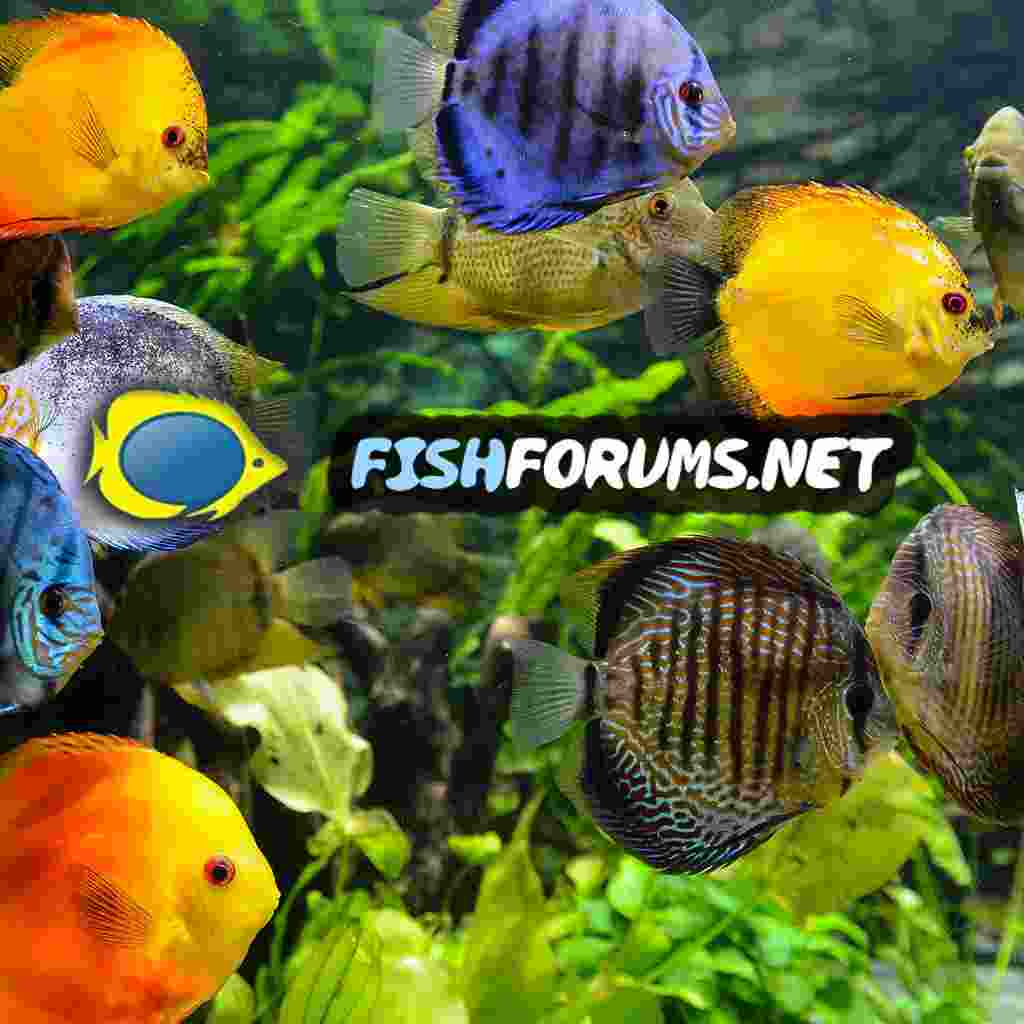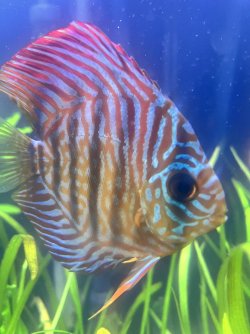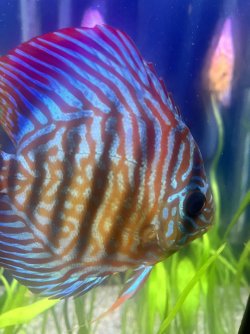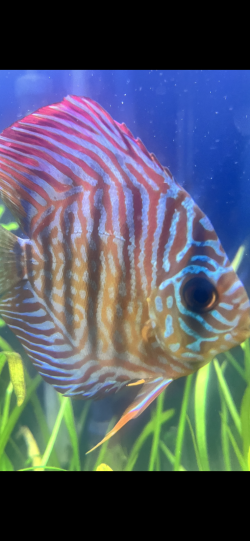I have just noticed a white spot on one of my discus. It almost looks like a pimple I think he is the male. I only noticed because him and his “partner” have laid eggs that are now wigglers, so I was up close getting a video. He is also displaying his “stress stripes” for the first time ever - never seen them before(though I imagine this is related to breeding). Besides this, he is eating well, energetic and protecting his fry as you’d expect.
🌟 Exclusive Amazon Black Friday Deals 2024 🌟
Don’t miss out on the best deals of the season! Shop now 🎁
You are using an out of date browser. It may not display this or other websites correctly.
You should upgrade or use an alternative browser.
You should upgrade or use an alternative browser.
White spot on discus
- Thread starter Oli
- Start date
It doesn't look like a disease but more a small bump covered in excess mucous. This could be caused by the babies. When discus breed they start to produce more mucous over their body for the babies to feed off. If there are any unusual lumps or bumps they will appear more noticeable and cream or white in colour due to the excess mucous. I would monitor it and post more pictures or another video if it gets worse. The video is good and shows it better than the photos.
The dark bars on the fish are from breeding and having babies to look after. Nothing to worry about.
The dark bars on the fish are from breeding and having babies to look after. Nothing to worry about.
Thanks for the response Colin,It doesn't look like a disease but more a small bump covered in excess mucous. This could be caused by the babies. When discus breed they start to produce more mucous over their body for the babies to feed off. If there are any unusual lumps or bumps they will appear more noticeable and cream or white in colour due to the excess mucous. I would monitor it and post more pictures or another video if it gets worse. The video is good and shows it better than the photos.
The dark bars on the fish are from breeding and having babies to look after. Nothing to worry about.
Weirdly enough I’ve just had a closer look and seem near enough the exact same thing on the other side of the gills. The fish is still eating well and very active - hopefully this is correlated to the breeding although I do believe this one is the male? Would males also produce that mucous for the babies?
I will monitor closely and keep up with water changes
Thanks
Male and female discus both produce excess mucous for the babies to feed off. The fry will feed off one parent and when that fish has had enough they swim over to their partner and shake. The babies then swap parents and feed off the other one.
You can start offering newly hatched brineshrimp after a few days. Don't expect the fry to eat it straight away, some will and some won't. You will need to get the fry to eat a variety of foods like newly hatched brineshrimp and microworms so they don't eat the parents. That sounds bad but it's not really that bad. Sometimes if the parents have a lot of fry, the fry can eat all the mucous off the adults and then start grazing on their skin. This can damage the parent's skin and lead to infections. If the fry are eating a variety of foods (brineshrimp, microworms) in addition to grazing on the parents, there is less chance of this happening. If it does happen, you usually have to remove some or all of the fry so they don't harm the adults. If the fry are eating other foods when you move them, they will survive and do well. If they aren't eating other foods and you have to separate them from the adults, the babies usually die.
You can start offering newly hatched brineshrimp after a few days. Don't expect the fry to eat it straight away, some will and some won't. You will need to get the fry to eat a variety of foods like newly hatched brineshrimp and microworms so they don't eat the parents. That sounds bad but it's not really that bad. Sometimes if the parents have a lot of fry, the fry can eat all the mucous off the adults and then start grazing on their skin. This can damage the parent's skin and lead to infections. If the fry are eating a variety of foods (brineshrimp, microworms) in addition to grazing on the parents, there is less chance of this happening. If it does happen, you usually have to remove some or all of the fry so they don't harm the adults. If the fry are eating other foods when you move them, they will survive and do well. If they aren't eating other foods and you have to separate them from the adults, the babies usually die.
fishorama
Fish Crazy
I see what you mean by the whiter areas, but I agree with Colin. Try some "baby foods" & be ready to move the fry. Baby brine shrimp (newly hatched or less good but ok, frozen). Microworms were not something I tried but also a good choice.
It's good for the tiny fry to feed off parents' slime coat but you need another food source when parent slime coat is not enough. The parents "should" allow the fry to graze on them but after a short while it taxes the parents if there are many or growing fry. You'll need to move the fry or parents.
If you don't have a plan in place, observe & be ready for the next time. Once fish start breeding, they usually continue every month or so.
I love you strain of discus, so pretty! 1 of my all time favorites. Good luck!
It's good for the tiny fry to feed off parents' slime coat but you need another food source when parent slime coat is not enough. The parents "should" allow the fry to graze on them but after a short while it taxes the parents if there are many or growing fry. You'll need to move the fry or parents.
If you don't have a plan in place, observe & be ready for the next time. Once fish start breeding, they usually continue every month or so.
I love you strain of discus, so pretty! 1 of my all time favorites. Good luck!
I am not planning on raising the fry - I do not have another tank, nor the time or money.
I was planning to just let nature take its course, but by the sound of it that could be dangerous for the parents?
I was planning to just let nature take its course, but by the sound of it that could be dangerous for the parents?
It's not really dangerous to the parents unless you have a huge number of young and small parents. Let the parents look after them but try and add some other food for the fry because some should survive.
What sort of food should I look to give the fry, and at what age?
Whilst I don’t have the time to transfer to a smaller tank and give the meticulous care discus fry need - I would be interested to provide them with nutrition and see what nature does. I live in a very isolated state, so difficult to get specialist things, live bbs would be a no.
Attached is a video of them tonight
Whilst I don’t have the time to transfer to a smaller tank and give the meticulous care discus fry need - I would be interested to provide them with nutrition and see what nature does. I live in a very isolated state, so difficult to get specialist things, live bbs would be a no.
Attached is a video of them tonight
You buy brineshrimp eggs and hatch them in salt water. You can use swimming pool salt to make up the salt water or sea water if you have access to it. There are farms in Western Australia that use salty ground water for their brineshrimp.
You might be able to find a microworm culture online and expand it. They get kept on oatmeal and fed bakers yeast.
You can buy rotifer and daphnia cysts online too.
You can try boiled egg yolk.
Offer these foods when the fry are a few days old if you can. If you can't get them for a few weeks that is fine and just offer small amounts a few times each day until you see the fry eating them well.
The following link has information on culturing live food for baby fish.

 www.fishforums.net
www.fishforums.net
You might be able to find a microworm culture online and expand it. They get kept on oatmeal and fed bakers yeast.
You can buy rotifer and daphnia cysts online too.
You can try boiled egg yolk.
Offer these foods when the fry are a few days old if you can. If you can't get them for a few weeks that is fine and just offer small amounts a few times each day until you see the fry eating them well.
The following link has information on culturing live food for baby fish.

Back to Basics when Breeding Fish
STARTING OUT Make sure you have a pair, (1 male + 1 female). There is nothing worse than spending your hard-earned dollars buying a couple of fish to try and breed and ending up with a pair of fish of the same sex. Let's face it, to reproduce fish you need a male and a female. Two males won't do...
 www.fishforums.net
www.fishforums.net
Similar threads
- Replies
- 4
- Views
- 754
- Replies
- 13
- Views
- 6K




